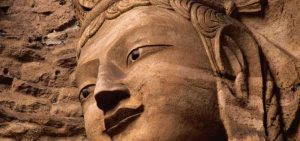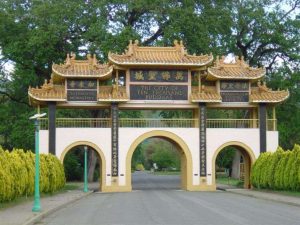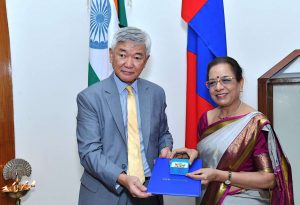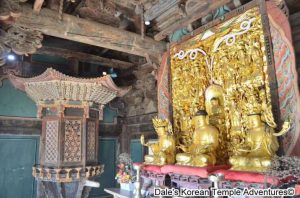
Beginner’s Mind is a special project from BDG collecting insightful essays written by US college students who have attended experiential-learning-based courses related to Buddhism. Some of the authors identify as Buddhists, for others it is their first encounter with the Buddhadharma. All are sharing reflections and impressions on what they’ve learned, how it has impacted their lives, and how they might continue to engage with the teaching.
Charlie Giunta wrote this essay for his Buddhist Literature course at Williams College in Massachusetts. He will graduate in 2023 with a major in Economics. Charlie is a member of the Williams College football team.
It’s always weird to read one’s old thoughts. Reading my pre-course survey responses and seeing how I thought shows me that although it feels like this semester flew by, I’ve grown more than I’d realized. When asked about my meditation experience, I said that I practiced mindfulness meditation. I was completely unaware of what meditation was beyond this Western conception or a guided meditation. I probably would have said that becoming better at meditation is sitting for a longer period of time. Looking back at my email response to the question “Why do I belong in this B-Lit community?” I responded: “Every day I practice mindfulness and meditation [with the Headspace app] but I know that my journey is only beginning.” But wow! I knew my journey was beginning, but I didn’t know where it would take me. Now I look back and laugh at my three-minutes-a-day mindfulness efforts. And I can laugh knowing that I’ll soon look back and laugh at what I do now.
I think about chapter seven of Keown, in which he talks about the jhānas in meditation. Meditation has been super helpful to me and yet I’m not sure that I’ve ever reached the first jhāna. I said that what I’d hoped to learn from this class is to be mindful. What I learned is how early on in the process I am. And this is the most valuable lesson I could have learned. I had thought that I was much further along in the process than I am. Before, I only saw the tip of the iceberg. This class opened my eyes to how much lies beneath.
In my email, I also mentioned Osho and Alan Watts as my introductions to Buddhism. They both said things that connected with me and made me think more deeply. However, I could never really understand exactly what they meant by some of what they said. This is because I lacked the proper Buddhist context to understand their words of wisdom. After a semester of gaining more context and insight into what Buddhism means, their words make much more sense to me and I can connect even more deeply than before. I wrote: “Alan Watts’ ideas on the illusion of the ego, not taking life too seriously, and how happiness and pleasure are not the meaning to life have all been greatly impactful in shaping my thoughts.” Through my experiences with the experiential-learning assignments and the vipassanā style of meditation, I have a much clearer understanding of what Alan Watts is referring to when he talks about the “illusion of the ego.”
I also wrote about Osho and how he talks about our inner nothingness, saying to “go inside yourself.” After my final group project on the Heart Sūtra, I now understand what Osho is saying through the lens of emptiness, which is achieved through what Watts talks about with the illusion of the ego. I used sources from both Watts and Osho on my final project. It was such a cool and interesting experience to go back and look at the people who have influenced me to be here and to see how I relate to their ideas in a whole new way now. The Heart Sūtra was the perfect final project for me as it sums up some main ideas from Buddhism as a whole and is something that both of my original influences spoke and wrote about extensively. This experience was one of the most powerful of the semester.
I meditate at least once each day now because of the habits formed from the experiential-learning assignment. I have been practicing the sitting vipassanā style of meditation that we learned. Now that the weather is nice, I plan to start practicing walking meditation. Also, I want to try the meditation of studying an object for an extended time. I haven’t tried it yet, but I’m excited to see if I can experience emptiness. My social media use is also less than before our cleanse exercise. I admit that the desire to use social media is always present, but now I’m more confident in fighting that want and using it less. I’ve unfollowed accounts that clogged my timeline and encourage me to waste my time. The habits formed in the experiential-learning assignment are still impacting me and helping me have more meaningful days.
From here, I plan to continue my Buddhist journey, both inside and outside of school. Along with experimenting with meditation, I can put more focus on the precepts and even set aside days or follow Buddhist holidays where I undertake all eight precepts. Undertaking the precepts for Māgha Pūjā was a powerful experience and I had many good thoughts that day. With my new understanding of the Buddhist context, I will continue to look into Watts and Osho, and also expand to other Buddhist teachers and learn more on my own time. At Williams, I will absolutely take more classes on Buddhism and related to Buddhism.
I’ve grown a lot throughout the semester, but the one thing I know for certain is that I have a long way to go. To describe this course and my learning experience in one word, I would choose “growth.” My greatest understanding is that the journey is only beginning for me. I have much more to learn and much growing to do!
References
Keown, Damien. 2000. Buddhism: A Very Short Introduction. Oxford: Oxford Universirty Press.
Related features from BDG
That’s a Good Question . . .
A Reflection on Personal Goals Past, Present, and Future
Practice











